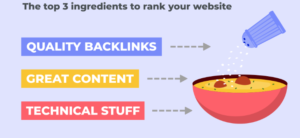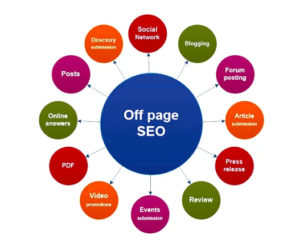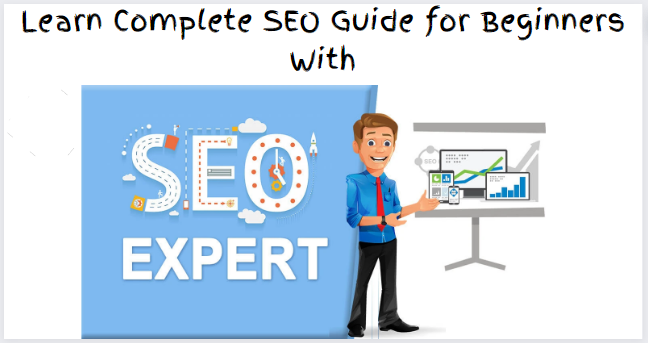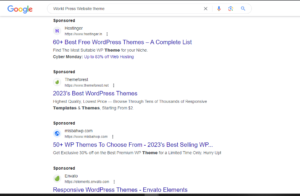Learn SEO With SEO Expert : Complete SEO Guide for Beginners even your grandma would understand
Are you interested in learning SEO but unsure of where to begin? Discover everything you need to know to move forward with search engine optimization on your own by reading our comprehensive Blog For Learn Complete SEO Guide for Beginners With SEO Expert
1. SEO basics
Let’s go over the fundamental concepts, vocabulary, and commonly asked questions of SEO before getting into particular tactics and features of the field. Are you prepared? Now let’s get going!
Chapter navigation
- What is SEO?
- SEO in a nutshell
- Useful vocabulary
- FAQs
2. What is SEO? and Why SEO important in the Present Days?
The practice of upgrading your website for search engines with the aim of rising in the search results and gaining more natural (non-paid) visitors is known as search engine optimization, or SEO.
When search engines first became popular in the 1990s, SEO history began. These days, it’s a vital marketing tactic and a sector that is expanding constantly.
PPC optimization is not a part of SEO; instead, it concentrates solely on organic search results. PPC and SEO are components of search engine marketing.
SEO is essential for increasing visibility, credibility, and user experience, driving targeted traffic, and staying competitive in the ever-evolving online landscape.
3. Example PPC And SEO
PPC Example
SEO Example

Internet users utilize search engines when they are looking for something.
And you wish to address that issue by offering a solution. Any website owner who wants to sell goods or services, run a blog, or do anything else needs to invest in search engine optimization.
To put it in easy terms:
SEO is the culmination of all the things you do to elevate your website’s search engine ranking and make Google view it as a reliable source.
Note: Although SEO stands for “search engine optimization,” we could just call it “Google optimization” given Google’s present dominance.
Because of this, the majority of the advice and methods in this article are focused on Google SEO, even though many of them are applicable to optimization for other search engines as well.
4. A brief summary of SEO
It is not necessary for you to be aware of EVERY element and the precise algorithms Google employs to rank your website. However, in order to succeed, you must cover the essential elements of SEO.
To easily comprehend the three most crucial elements, picture the SEO ingredients as a bowl of SEO ingredients.

Three essential components make up SEO:
Technical stuff: Often referred to as technical or on-page SEO, the bowl symbolizes all the technical elements you must address. There would be nothing to contain the ingredients in the absence of a suitable bowl.
Excellent content: The ingredients symbolizes your website’s content, which is its most crucial component. It is simple: no rankings for low-quality content.
High-quality backlinks: The seasoning stands in for the backlinks that give your website more authority. Even with excellent content and a flawlessly optimized website, obtaining high-quality backlinks is the final component needed to create authority and complete your SEO ingredients.
We’ll examine each of these elements from a practical standpoint in the upcoming chapters.
5. Useful vocabulary
As soon as you begin studying SEO, you’ll run into a few common terms that attempt to group its different facets or methods, specifically:
- off-page and on-page SEO
- White hat and black hat SEO
It is beneficial to understand their meaning even though they are not particularly significant from a practical standpoint.
off-page and on-page SEO
The phrases “off-page” and “on-page” SEO classifies its activities according to whether they are carried out on the website.
Everything you can do on the website, from content optimization to technical elements, is referred to as on-page SEO.
- Keyword research
- Content optimization
- Title tag optimization
- Page performance optimization
- Internal linking
Ensuring optimal content and user experience while communicating the page’s purpose to search engines is the aim.
Note: The terms technical SEO and on-page SEO are sometimes used synonymously and sometimes to differentiate between optimization that is technically focused (e.g., page speed) and optimization that is related to content (e.g., title tags).
off-page SEO: Obtaining high-quality backlinks is the main goal of off-page SEO since it demonstrates to search engines the authority and value of your website. Link building strategies could include things like:

Additionally, off-page SEO is closely related to other online marketing strategies like branding and social media marketing, which indirectly contribute to increasing the authority and trustworthiness of your website.
Never forget that both on-page and off-page SEO tactics are necessary for a successful SEO strategy.
White hat SEO vs. black hat SEO
White Hat SEO:
- Ethical Techniques: White hat SEO refers to strategies and techniques that align with search engine guidelines and focus on human audiences rather than solely on search engines.
- Quality Content: Emphasizes creating high-quality, relevant, and valuable content for users. Content is optimized with appropriate keywords, relevant metadata, and proper structure.
- Ethical Link Building: Focuses on acquiring backlinks naturally through genuine outreach, content marketing, and relationship building.
- Long-Term Results: Although it might take longer to see results, white hat SEO aims for sustainable, long-term rankings that are less prone to sudden drops due to search engine algorithm changes.
Black Hat SEO:
- Unethical Techniques: Black hat SEO involves methods that manipulate search engine algorithms, often violating search engine guidelines.
- Keyword Stuffing: Involves overloading content with excessive and irrelevant keywords to manipulate rankings.
- Cloaking: Shows different content to search engines than what users see, tricking search engines to rank pages higher than they should.
- Link Farming and Buying Links: Involves acquiring backlinks through illegitimate means, like link farms (sites created for the sole purpose of linking to each other) or buying links from unrelated or low-quality sites.
- Short-Term Gains, Long-Term Risks: Black hat techniques can lead to quick ranking improvements but can result in penalties, causing a website to be removed from search engine indexes entirely.
Key Differences:
- Ethical Compliance: White hat SEO follows search engine guidelines, while black hat SEO seeks loopholes or manipulative tactics that violate these guidelines.
- Quality vs. Manipulation: White hat SEO focuses on quality content and user experience, while black hat SEO employs manipulative strategies for quick gains.
- Risk Levels: White hat SEO provides more sustainable and lasting results with minimal risk of penalties, whereas black hat SEO poses significant risks, including potential penalties or getting banned from search engine results.
In essence, white hat SEO emphasizes ethical practices, quality content, and long-term results, while black hat SEO focuses on exploiting vulnerabilities in search engine algorithms, often leading to short-term gains but with substantial risks.
6. Frequently asked questions
1. Can I do SEO on my own?
SEO is not easy. But it’s no rocket science either.
There are things you can implement right away and there are concepts that will take much more time and effort. So yes, you can do SEO on your own.
The only question is whether you are willing to invest some time into learning all the aspects of SEO, or you’ll hire a professional and invest your time into something else.
2. How can I learn SEO?
There’s a couple of things you should do to learn SEO:
- Read reliable resources
- Get hands-on experience
- Don’t be afraid of experiments
- Have a lot of patience (SEO is a marathon, not a sprint)
Implementing the things from this guide is a great way to start 🙂
3. How long does it take to learn SEO?
To answer this question, we’ll use a common answer of SEO experts to almost any SEO issue: it depends.
While understanding the basics won’t take you longer than a couple of weeks, the actual mastering of this discipline depends largely on the practice, which is a question of months, even years.
Last but not least, SEO is evolving all the time. You should always keep learning and stay updated with the latest updates, experiments and findings.
4. Do I need SEO tools?
If you’re serious about SEO, you shouldn’t neglect the useful data and insights provided by various SEO tools. They give you a great competitive advantage and save a lot of your time.
Here are some essential SEO tools every website owner should use:
- Google Search Console
- a traffic analysis tool (e.g. Google Analytics)
- a keyword research tool (e.g. KWFinder)
- a backlink analysis tool (e.g. LinkMiner)
- a rank tracker (e.g. SERPWatcher)
5. Why is keyword research important for SEO?
Keyword research helps identify the words and phrases users type into search engines when looking for information. By understanding these terms, websites can optimize their content to match user intent, improving the chances of ranking higher for relevant searches.
6. How does link building impact SEO?
Link building involves acquiring links from other websites to your own. Search engines view these links as votes of confidence, indicating that your content is valuable and authoritative. Quality backlinks from reputable sites can significantly improve a website’s search engine rankings.
7. What role does content play in SEO?
Content is a cornerstone of SEO. High-quality, relevant, and engaging content not only attracts users but also signals to search engines that your website is a valuable resource. Good content can increase dwell time, reduce bounce rates, and encourage natural sharing and linking, all of which positively impact SEO.
8. What is the difference between on-page and off-page SEO?
- On-Page SEO: Refers to optimizations made directly on the website, including content, meta tags, HTML code, site structure, and internal linking.
- Off-Page SEO: Involves actions taken outside the website to improve its visibility, such as link building, social media marketing, and influencer outreach.
9. How long does it take to see results from SEO efforts?
SEO is a long-term strategy, and the timeline for seeing results can vary based on various factors like website age, competition, content quality, and the level of optimization. Generally, it can take several months to a year to see significant improvements in rankings.
10. What are some common SEO mistakes to avoid?
- Keyword stuffing (overusing keywords unnaturally)
- Ignoring mobile optimization
- Neglecting technical SEO issues (site speed, crawl errors)
- Duplicate or thin content
- Buying links or using black hat techniques
11. How can I track and measure SEO success?
Tools like Google Analytics and Google Search Console provide valuable data for tracking SEO performance. Metrics such as organic traffic, keyword rankings, backlink quality, conversion rates, and engagement metrics help measure the effectiveness of SEO efforts.
These answers should give a good starting point for understanding key aspects of SEO and its various elements.
12. Is SEO dead?
When people use the phrase “SEO is dead”, they usually mean that “the spammy attempts to cheat the Google algorithm that were used 10 years ago are dead”.
Other than that, search engine optimization is an essential marketing strategy and an ever-growing industry.
Sources: Mangools
Our Next blog all about information of Search engines




